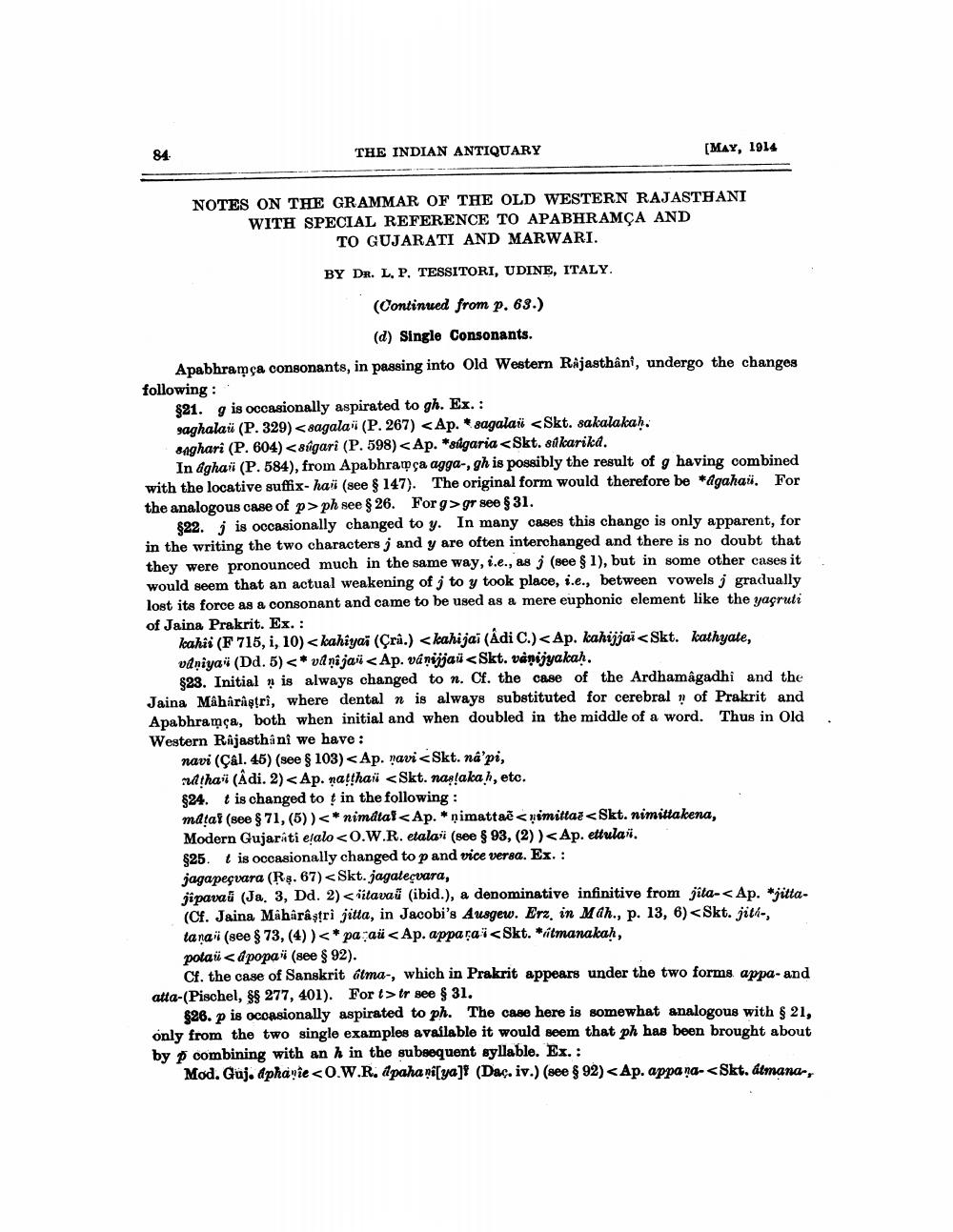________________
84.
THE INDIAN ANTIQUARY
following:
NOTES ON THE GRAMMAR OF THE OLD WESTERN RAJASTHANI WITH SPECIAL REFERENCE TO APABHRAMÇA AND TO GUJARATI AND MARWARI.
BY DR. L. P. TESSITORI, UDINE, ITALY.
(Continued from p. 63.)
(d) Single Consonants.
Apabhramça consonants, in passing into Old Western Rajasthân, undergo the changes
(MAY, 1914
§21. g is occasionally aspirated to gh. Ex.:
saghalau (P. 329) <sagala" (P. 267) <Ap. sagala <Skt. sakalakaḥ.
saghari (P. 604) <sugari (P. 598) <Ap. *sigaria <Skt. sikarika.
In aghai (P. 584), from Apabhramça agga-, gh is possibly the result of g having combined with the locative suffix- hai (see § 147). The original form would therefore be *agahau. For the analogous case of p>ph see § 26. For g>gr see § 31.
§22. j is occasionally changed to y. In many cases this change is only apparent, for in the writing the two characters j and y are often interchanged and there is no doubt that they were pronounced much in the same way, i.e., as j (see § 1), but in some other cases it would seem that an actual weakening of j to y took place, i.e., between vowels j gradually lost its force as a consonant and came to be used as a mere euphonic element like the yacruti of Jaina Prakrit. Ex.:
kahii (F 715, 1, 10) <kahiyni (Çri.) <kahijai (Adi C.)<Ap. kahijjai <Skt. kathgate, vaniya (Dd. 5) <* vanija <Ap. váņijjaü<Skt. vanijyakaḥ.
§23. Initial is always changed to n. Cf. the case of the Ardhamâgadhi and the Jaina Mâhârâştri, where dental n is always substituted for cerebral of Prakrit and Apabhramça, both when initial and when doubled in the middle of a word. Thus in Old Western Rajasthanî we have:
navi (Çâl. 45) (see § 103) <Ap. navi<Skt. nâ'pi,
natha" (Adi. 2)<Ap. naṭṭhai <Skt. naṣṭakaḥ, etc.
§24. t is changed to t in the following:
matal (see § 71, (5)) <* nimata!<Ap. *nimattae <imittae <Skt. nimittakena,
Modern Gujarati efalo <O.W.R. etala (see § 93, (2)) <Ap. ettula.
§25. t is occasionally changed to p and vice versa. Ex.:
jagapeçvara (Rs. 67) <Skt. jagatecvara,
jipava (Ja. 3, Dd. 2) <iitava (ibid.), a denominative infinitive from jita- <Ap. *jitta(Cf. Jaina Mahârâştri jitta, in Jacobi's Ausgew. Erz, in Mah., p. 13, 6)<Skt. jit-,
tanai (see § 73, (4)) <* pa au<Ap. apparai<Skt. *tmanakaḥ,
potai<apopai (see § 92).
Cf. the case of Sanskrit átma-, which in Prakrit appears under the two forms appa- and atta-(Pischel, §§ 277, 401). For t>tr see § 31.
§26. p is occasionally aspirated to ph. The case here is somewhat analogous with § 21, only from the two single examples available it would seem that ph has been brought about by p combining with an h in the subsequent syllable. Ex.:
Mod. Guj. aphanie <O.W.R. paha niya] (Dac. iv.) (see § 92) <Ap. appaṇa- <Skt. átmana,




